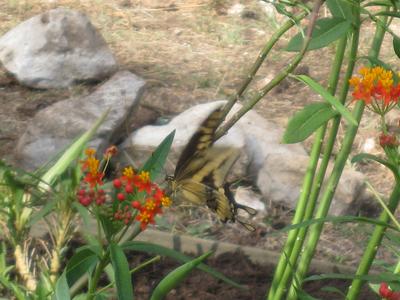My family and I enjoy visiting Walnut Creek Park here in Austin with our dogs and friends all throughout the year. This beautiful 300-acre woodland park is busy with strolling families, determined trail runners, frolicking leash-free dogs, and trail-riding, hill-leaping, rock-jumping cyclists. The biggest draw of all is nature, with woods, grasslands, crisscrossing streams, and abundant wildlife. This fall, the park has been adorned with spectacular blooms and berries, perhaps thanks to the well-timed rains we’ve had this season and earlier in the year.
FYI, these photos were taken with my smart phone over a three-week period.
Just three weeks ago, Maximilian Sunflowers (Helianthus maximiliani) brought bright sunshine to line the trails.
While many sunflowers are annuals, Maximilian Sunflowers are perennial members of the aster family, and while they wait all year until fall to finally show their true colors, the pollinators are grateful once they do.
Tucked into shadier areas, Calico Asters (Symphyotrichum lateriflorum) offered a subtle but happy fall presence.
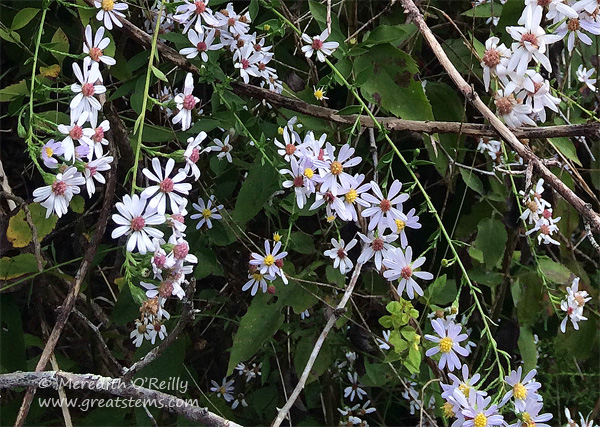
Calico Asters are so named because their disk flowers offer yellow centers that age to a darker red. The plant can have both colors on display at the same time.
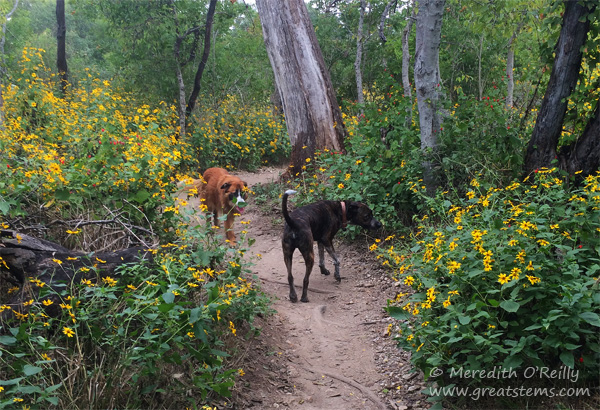
But the woodland areas also have their own yellow sunshine in the fall — Plateau Goldeneye (Viguiera dentata). This lovely aster is a prolific reseeder, but it is easy to manage. I have some special Goldeneyes in my backyard that were given to me by a dear woman who passed away this spring. They can reseed in my yard all they want, for each one is a memory of a wonderful environmental steward and friend.
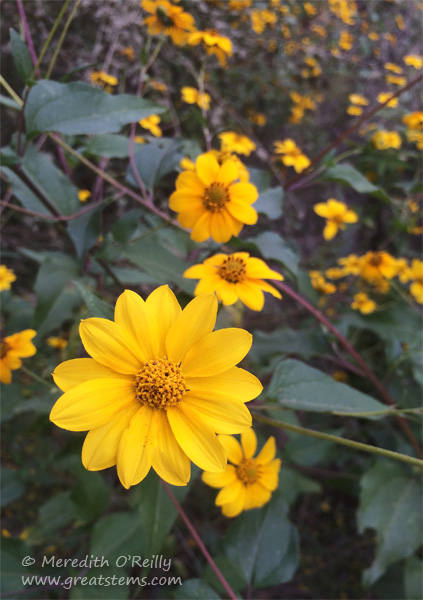
Plateau Goldeneye is not only beautiful, it is the host plant for Cassius Blue and Bordered Patch butterflies.
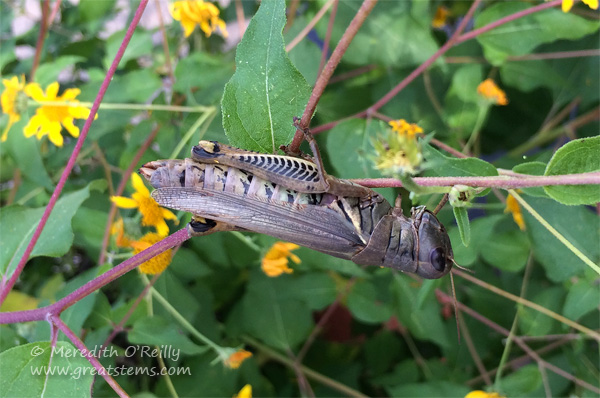
Apparently some grasshoppers find it tasty, too. This photo actually is of a muncher I saw at the Wildflower Center a couple of weeks ago. It didn’t bother to stop eating while I took its picture.
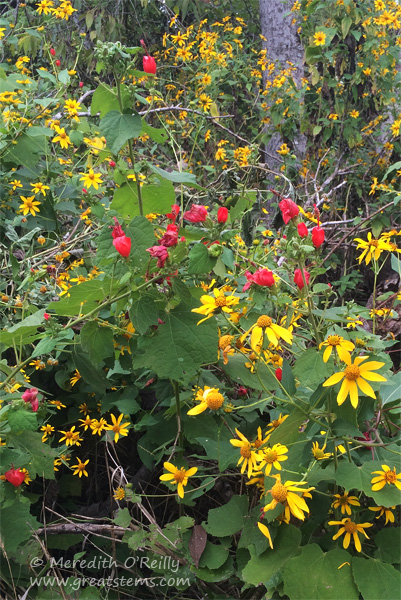
Above, Turk’s Cap (Malvaviscus arboreus var. drummondii) had a determined showing at Walnut Creek Park despite the abundant presence of Plateau Goldeneye. No worries, for it knows that its seasonal blooms will outlast the yellow ones of its aster companions.
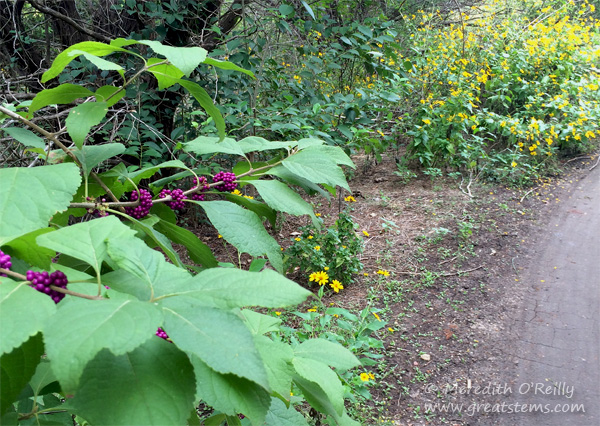
The berries of American Beautyberry (Callicarpa americana) gave a pleasantly shocking contrast of magenta. It’s hard to keep jogging or walking when these beautiful colors beckon you to stop. Mockingbirds would rather you keep going, however. Once you are out of the scene, they’ll get to work eating those beautiful berries.
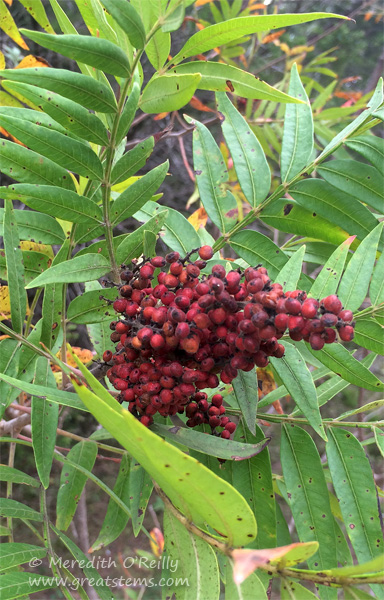
Clusters of Prairie Flameleaf Sumac (Rhus lanceolata) berries ripen in the fall to a dark red color. These tart berries can be soaked to create a lemonade of sorts, high in Vitamin C.
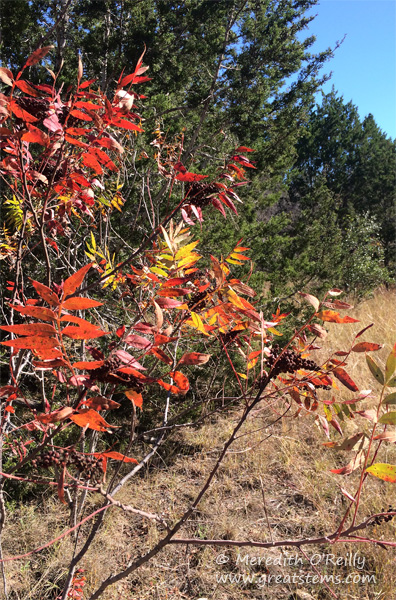
A few weeks later, the berries are shriveled, and the foliage changes to vibrant fall colors, well deserving of its Flameleaf name.
Sometimes the Walnut Creek woods open up to sudden pocket meadows, giving romping dogs opportunities to bounce above the grasses, chase rabbits, and collect many seeds in their fur.
Those grasses, catching sunlight with their wispy seedheads, have their own seasonal value, for they give wildlife an important food source throughout the cooler months ahead.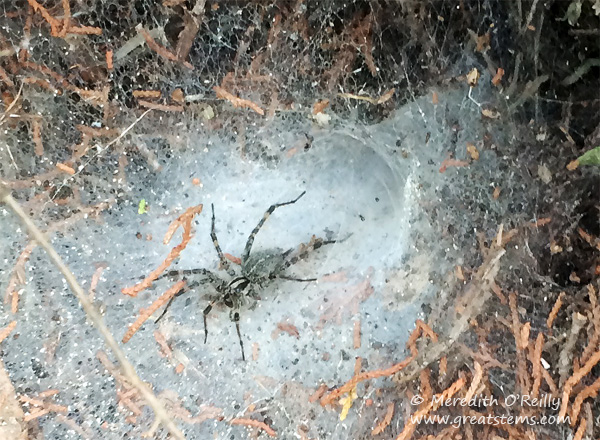
Not so much a bloom, this funnel weaver spider did at least come out of its cozy hiding spot to say hello as we traveled by.
Beautiful park, worth visiting if you are in Austin. Dogs, worn out and happy. Dog points earned for the family.
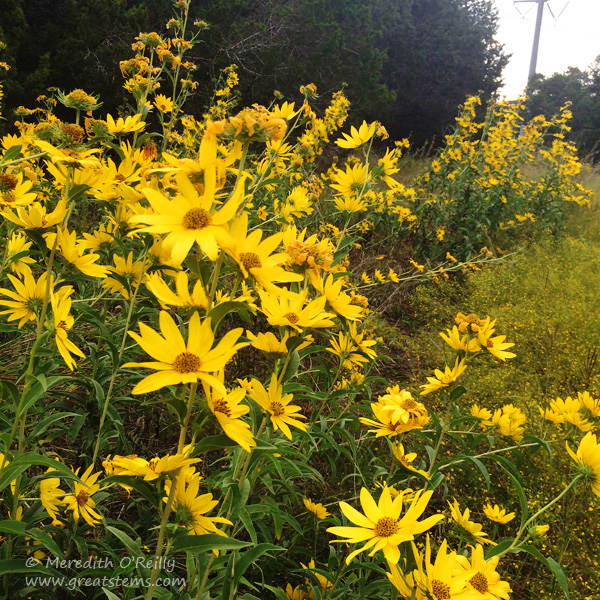
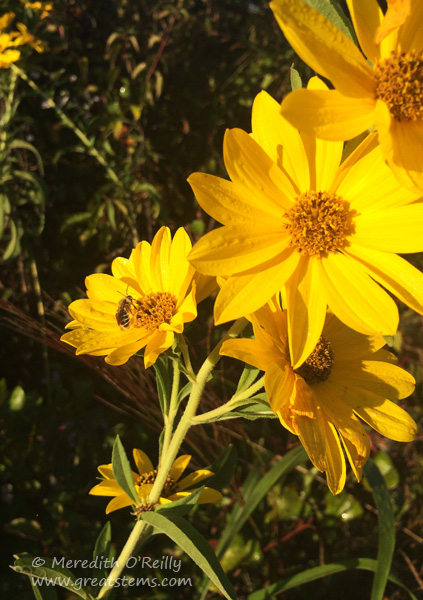
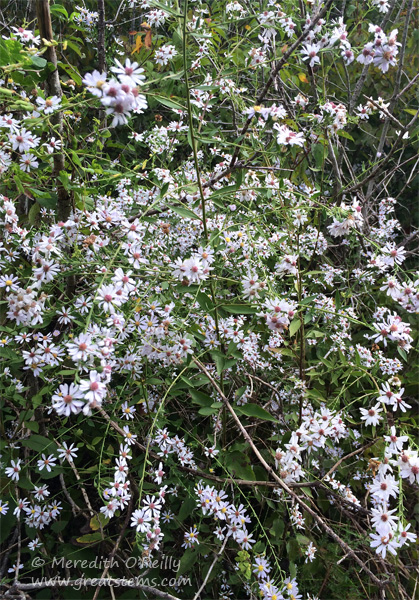
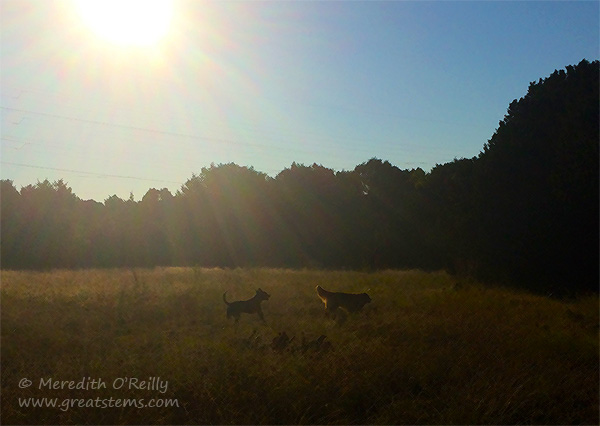
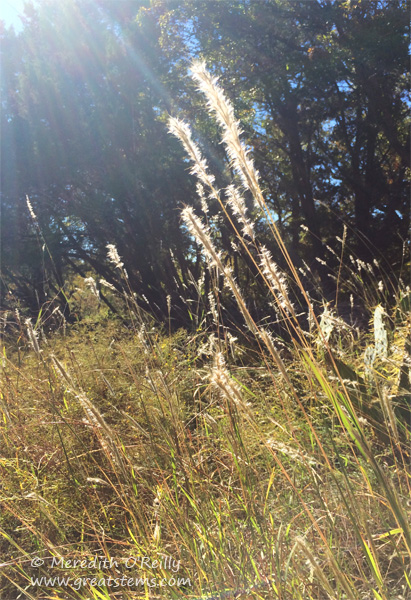
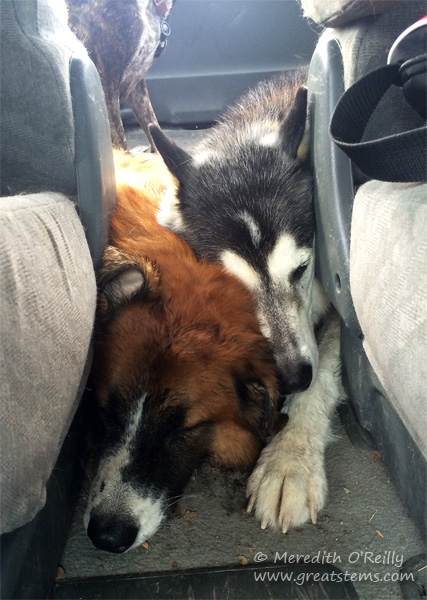
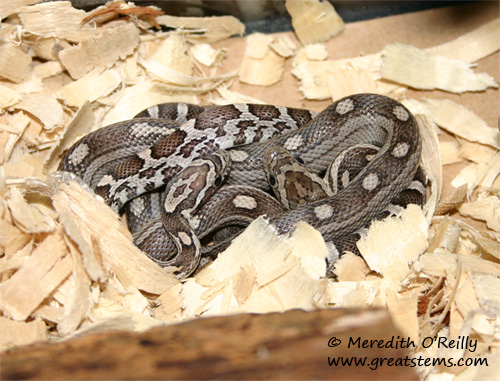
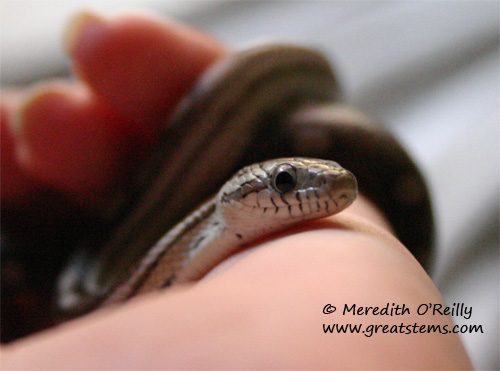
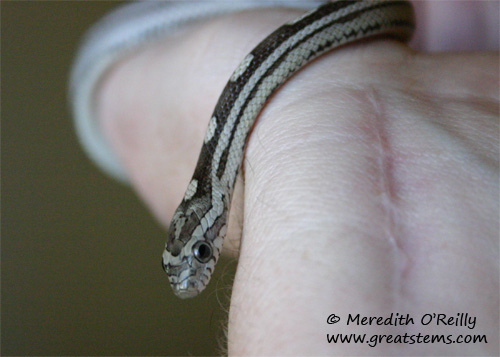 She is a corn snake, one that is an anerythristic motley (meaning she lacks red pigmentation and has that dotted pattern you see on her dorsal side). She likes to climb and explore, but she is also content to entwine herself through your fingers or to wrap around your wrist until you have a serpentine bracelet.
She is a corn snake, one that is an anerythristic motley (meaning she lacks red pigmentation and has that dotted pattern you see on her dorsal side). She likes to climb and explore, but she is also content to entwine herself through your fingers or to wrap around your wrist until you have a serpentine bracelet. 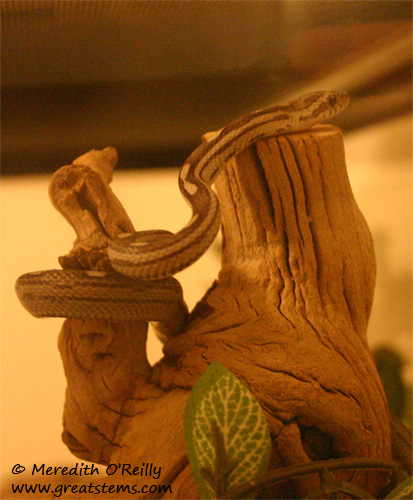
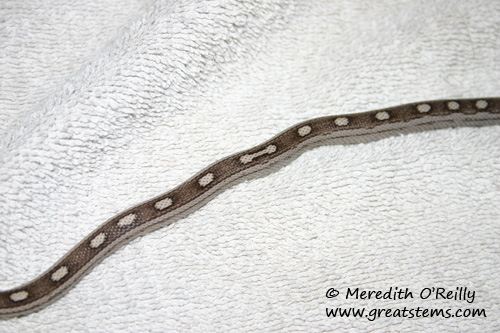
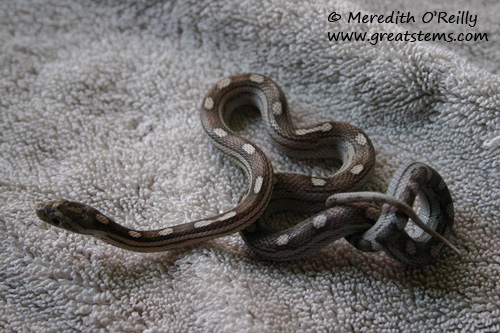
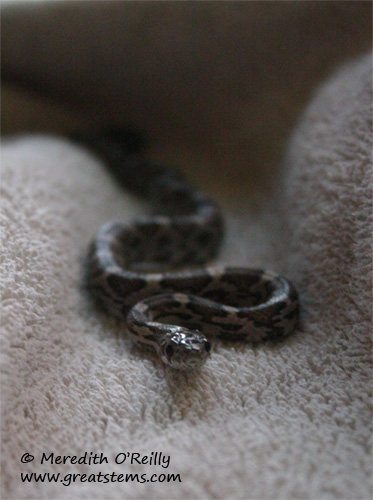
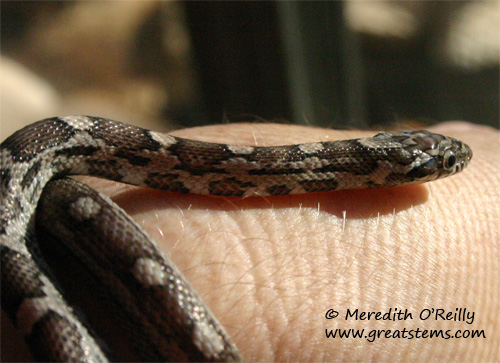
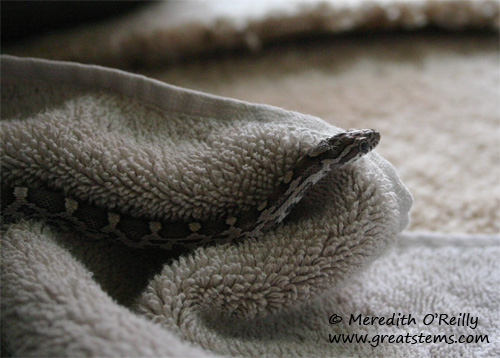
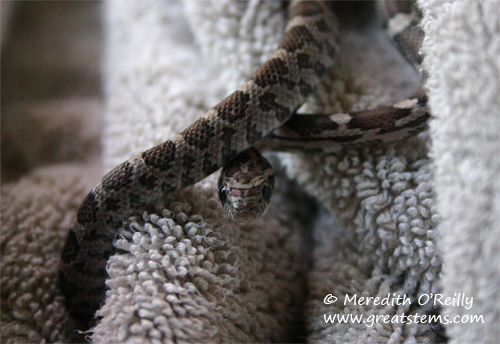 He’s most content staying on the ground, of course, and he moves quite comfortably on a relatively flat surface. And so we named our legless pet Walker, after MUCH deliberation, discussion, voting, and compromise between members of my family. A little bribing might have happened, too — hey, we know how politics work! For the record, Walker is his last name — now we’re deliberating, discussing, and so forth on the initials that will someday be in front of his name.
He’s most content staying on the ground, of course, and he moves quite comfortably on a relatively flat surface. And so we named our legless pet Walker, after MUCH deliberation, discussion, voting, and compromise between members of my family. A little bribing might have happened, too — hey, we know how politics work! For the record, Walker is his last name — now we’re deliberating, discussing, and so forth on the initials that will someday be in front of his name. 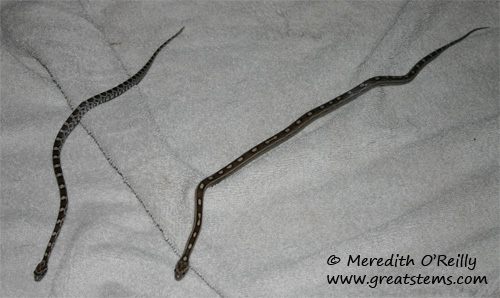
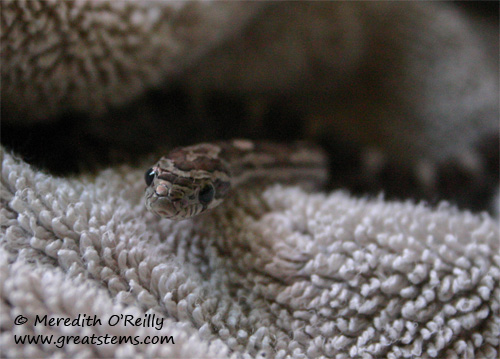
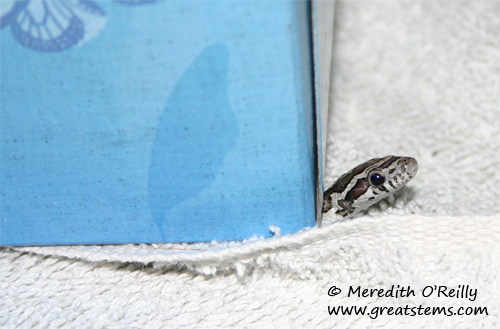
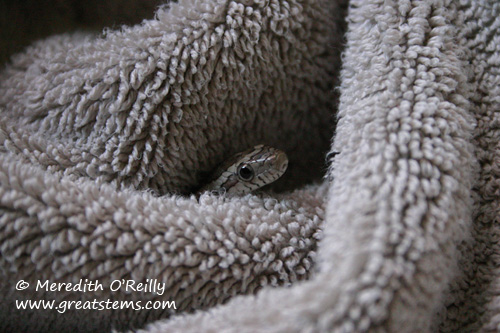
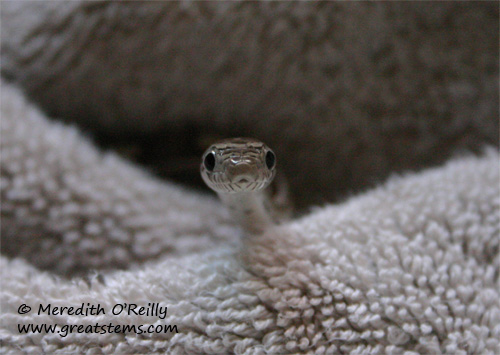
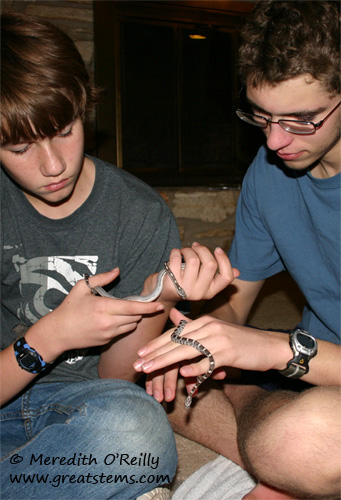
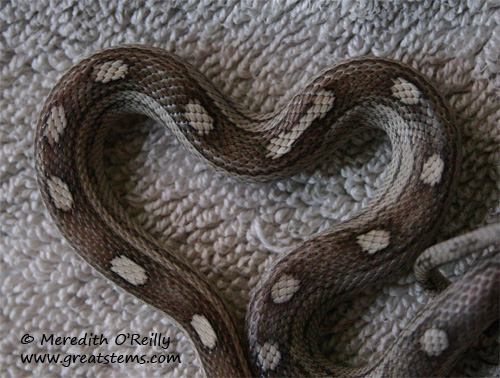
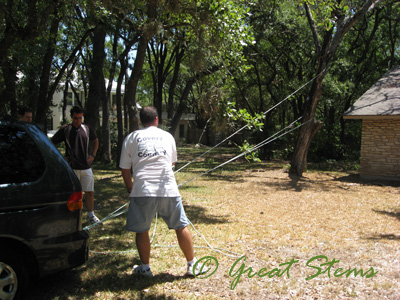
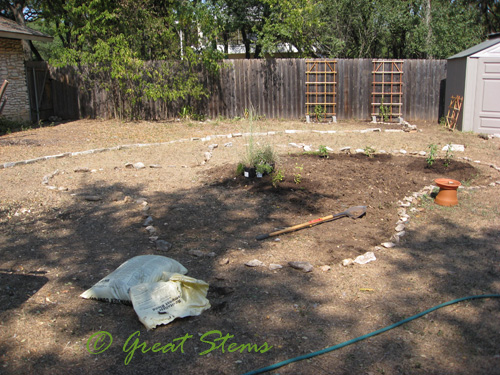
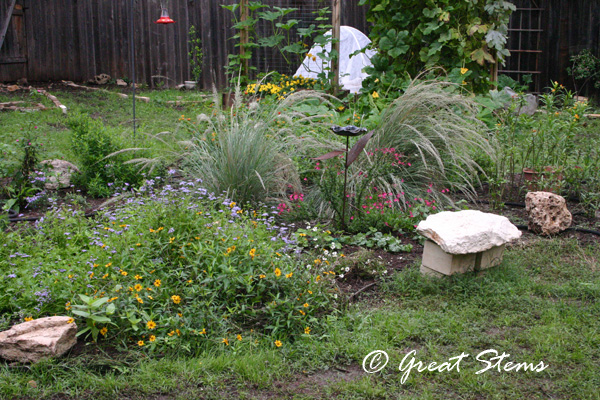
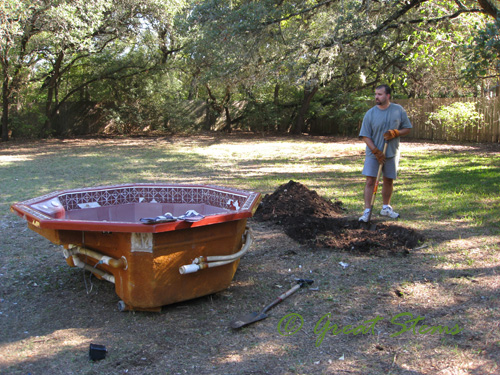
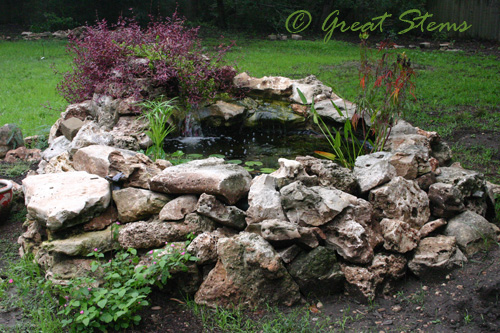

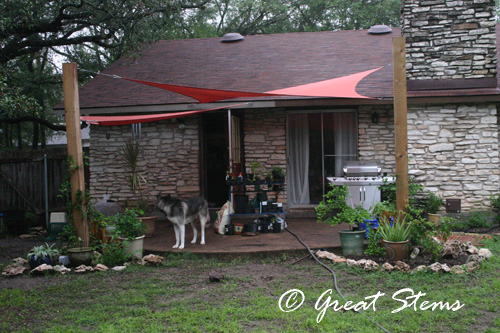
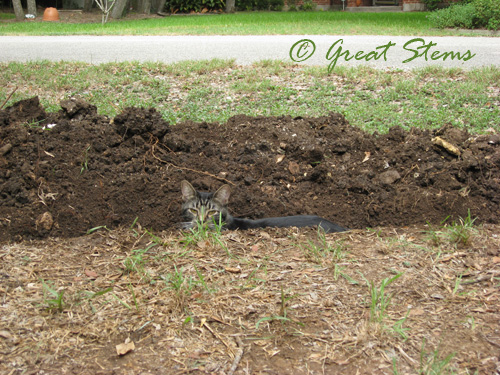
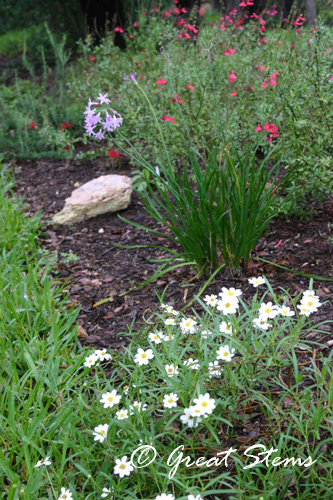 There’s a lot more to our yard than what you see here, and I invite you to
There’s a lot more to our yard than what you see here, and I invite you to 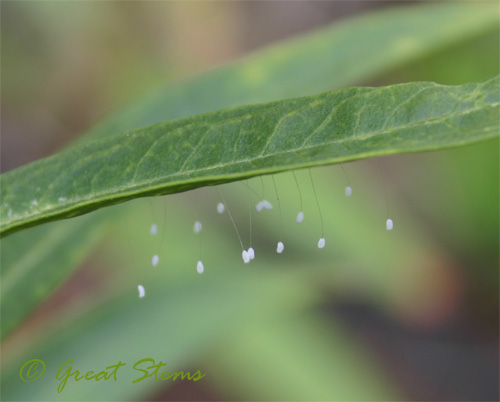 These are the eggs of green lacewings. As larvae, they are voracious aphid eaters. Yay, another ally in the garden! I need them because the aphids are worse than ever. I seem to have least three species now — I’ll call them green, yellow, and beige. The green I’m sure are corn leaf aphids. I have got to get out and tackle them TODAY. My veggies, my milkweed, and now my firebush plant are all having an aphid problem. The little pests took advantage of my time away from the garden during the rainy week and bred like rabbits. I’m starting to think that it’s the other way around, and rabbits breed like aphids. Today I’m seeing wings on some. Gah, more colonization!
These are the eggs of green lacewings. As larvae, they are voracious aphid eaters. Yay, another ally in the garden! I need them because the aphids are worse than ever. I seem to have least three species now — I’ll call them green, yellow, and beige. The green I’m sure are corn leaf aphids. I have got to get out and tackle them TODAY. My veggies, my milkweed, and now my firebush plant are all having an aphid problem. The little pests took advantage of my time away from the garden during the rainy week and bred like rabbits. I’m starting to think that it’s the other way around, and rabbits breed like aphids. Today I’m seeing wings on some. Gah, more colonization!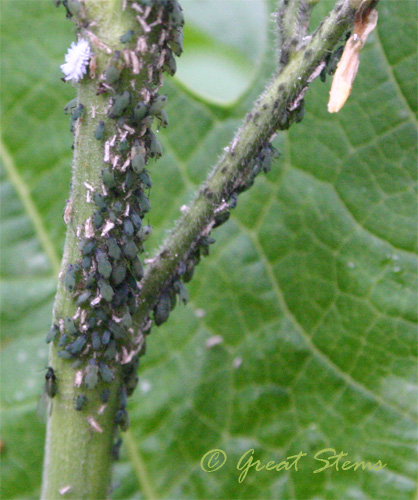
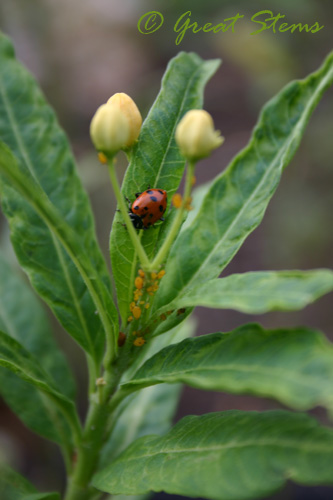 So I’ve got new lacewings arriving soon, and of course I’ve got ladybugs. More spiders are arriving, as are earthworms. The bees are getting plentiful, and I don’t even have to do the veggie porn thing to pollinate my plants anymore. I truly love the way nature just naturally (ha) balances its ecosystems. Got organic wastes? Happy earthworms move in. Got flowers? Let’s pollinate. Overpopulation of something? Here come the predators. And here come the predators to eat the other predators. Oh look, birdie treats. And then snakes. And hawks. Whee, life is grand.
So I’ve got new lacewings arriving soon, and of course I’ve got ladybugs. More spiders are arriving, as are earthworms. The bees are getting plentiful, and I don’t even have to do the veggie porn thing to pollinate my plants anymore. I truly love the way nature just naturally (ha) balances its ecosystems. Got organic wastes? Happy earthworms move in. Got flowers? Let’s pollinate. Overpopulation of something? Here come the predators. And here come the predators to eat the other predators. Oh look, birdie treats. And then snakes. And hawks. Whee, life is grand.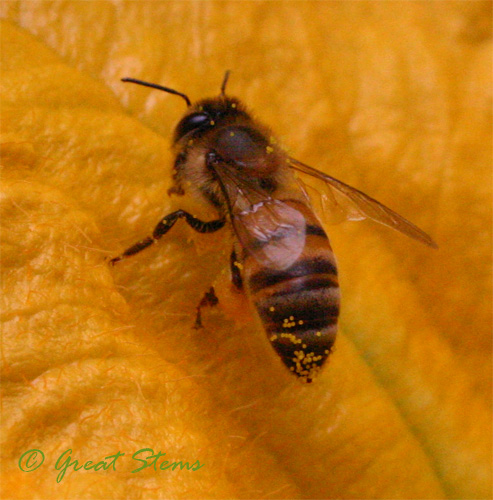
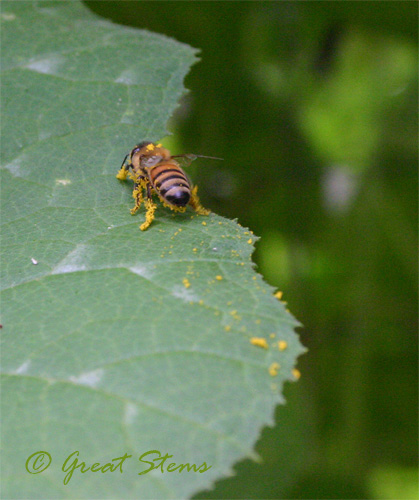
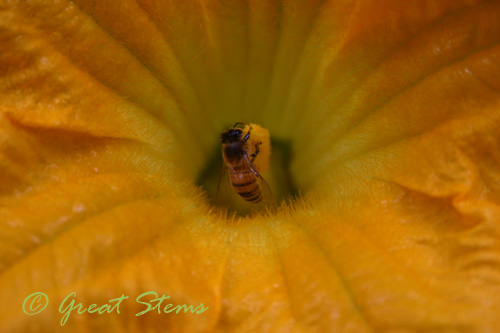
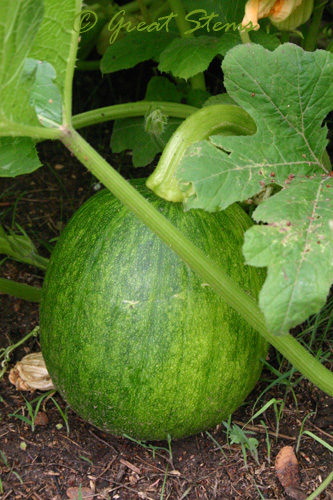
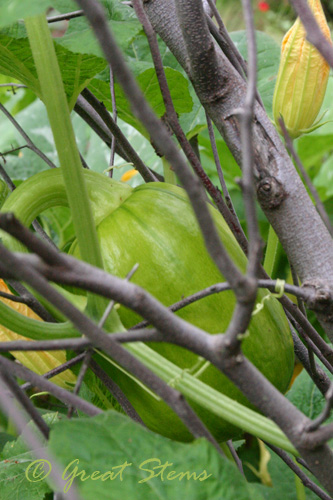 With the rain this week, the yard is a big mudfest for the dogs, and they took advantage of it — digging where they shouldn’t, trampling through the butterfly garden, and taking turns leaping over the pumpkin vines. I’m out there yelling, “This is not your playground!” And then I realized my neighbor must think I’m nuts, because of course it IS their playground. If I can manage it, I’ll try to get a picture of the husky leaping in full gallop over the massive pumpkin plants (in between my yelling at him, of course). It really is a sight to behold.
With the rain this week, the yard is a big mudfest for the dogs, and they took advantage of it — digging where they shouldn’t, trampling through the butterfly garden, and taking turns leaping over the pumpkin vines. I’m out there yelling, “This is not your playground!” And then I realized my neighbor must think I’m nuts, because of course it IS their playground. If I can manage it, I’ll try to get a picture of the husky leaping in full gallop over the massive pumpkin plants (in between my yelling at him, of course). It really is a sight to behold. 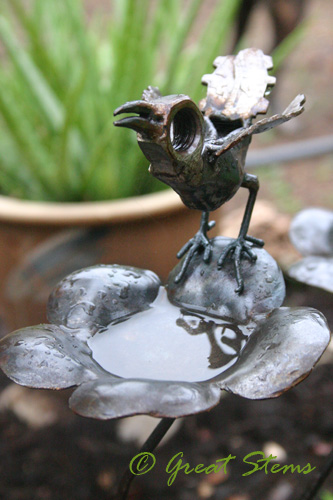
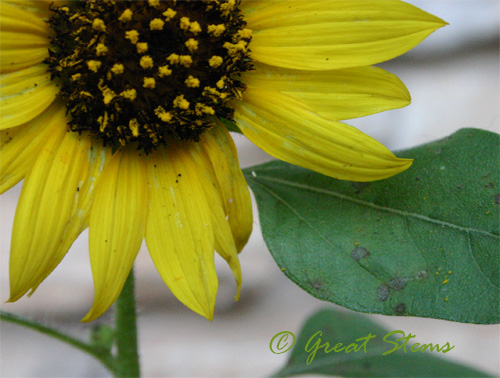
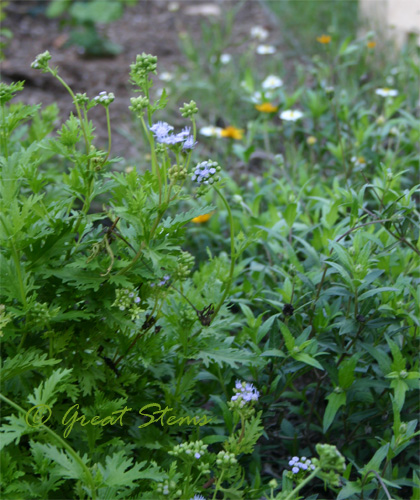 The Pigeonberry plants are blooming like crazy. They berry, too, but the birds pick them off so fast.
The Pigeonberry plants are blooming like crazy. They berry, too, but the birds pick them off so fast.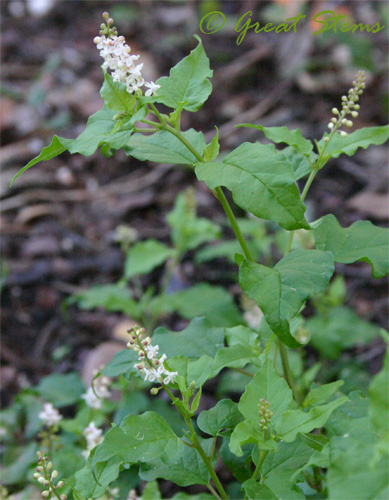
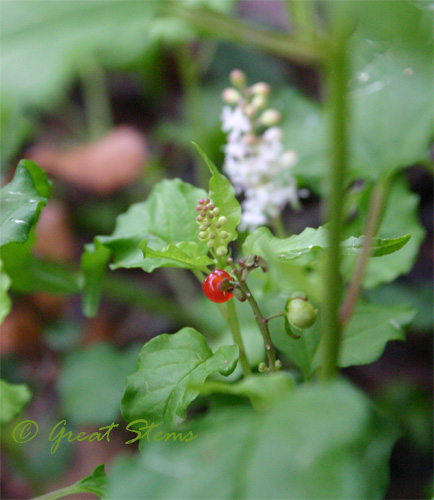
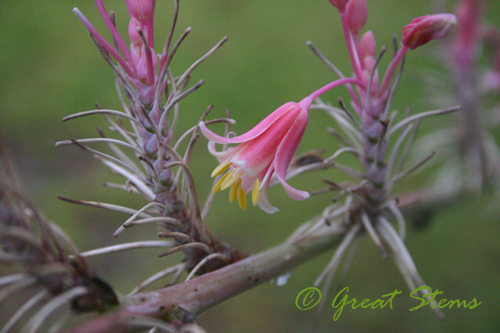
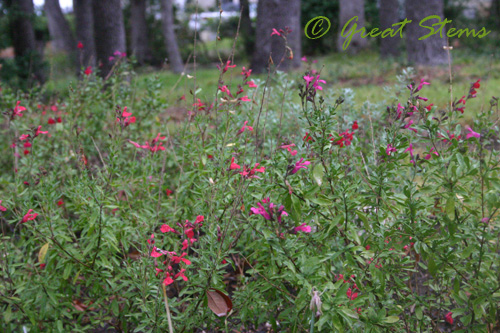
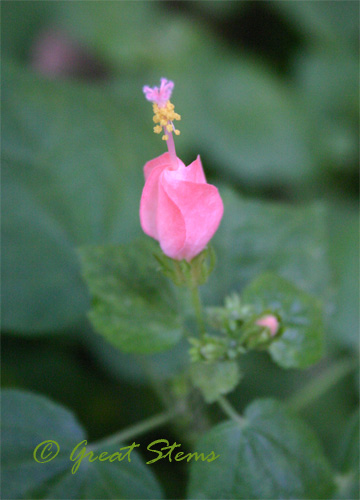
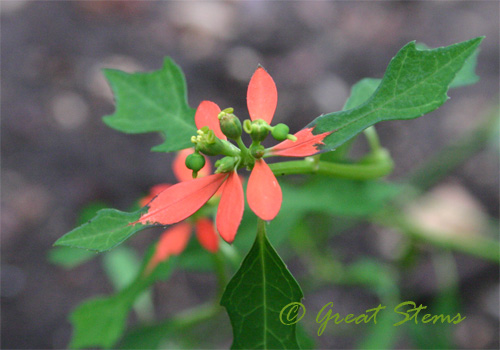
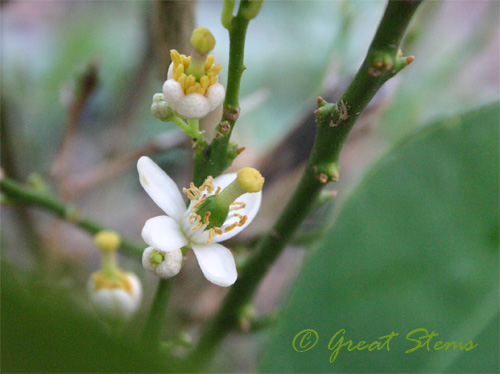
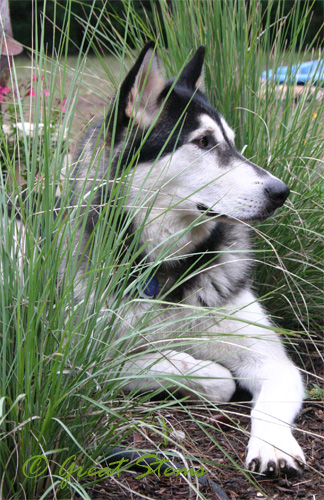
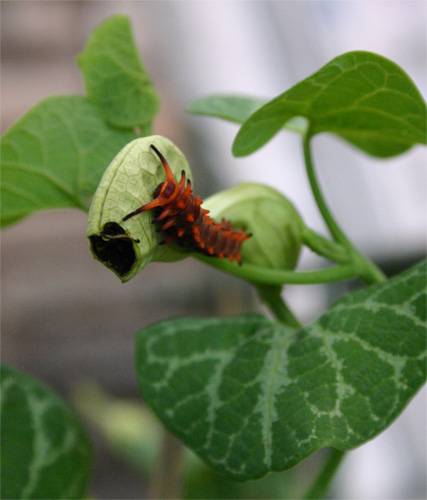
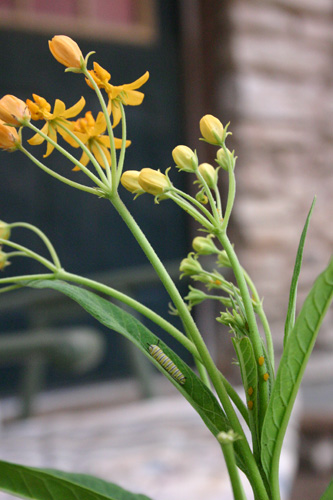
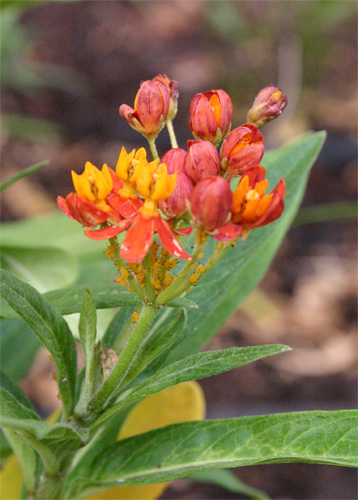
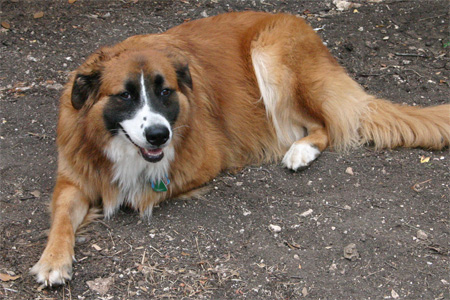
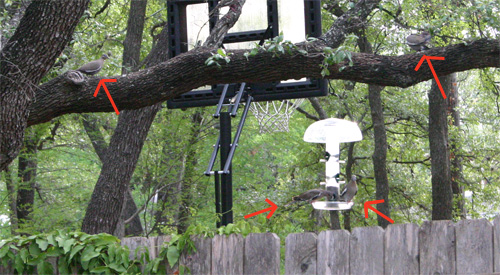
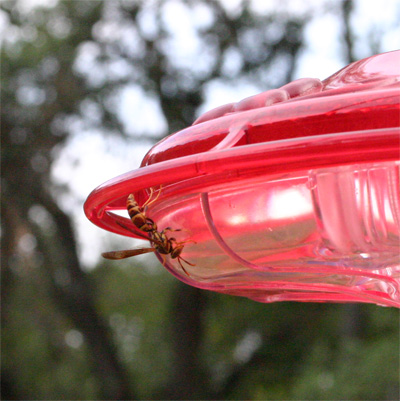
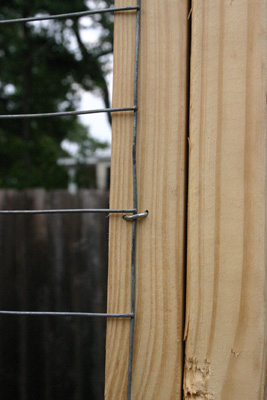
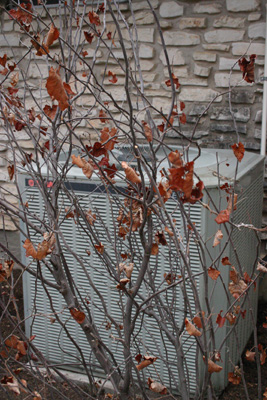
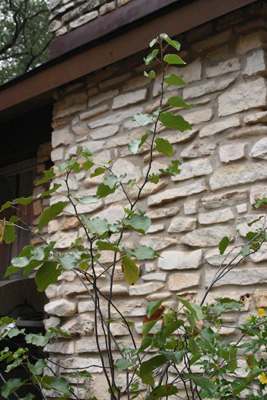
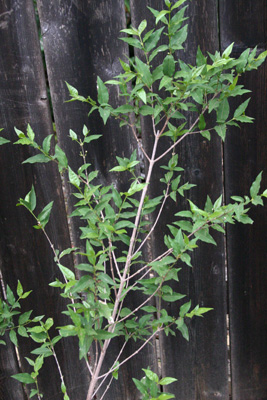
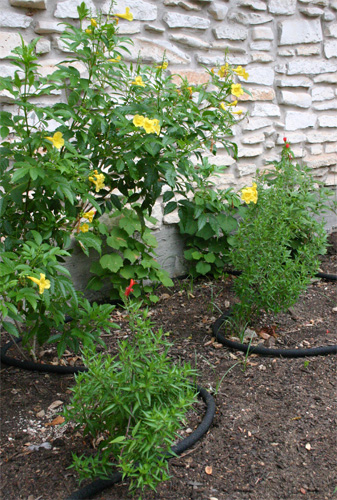
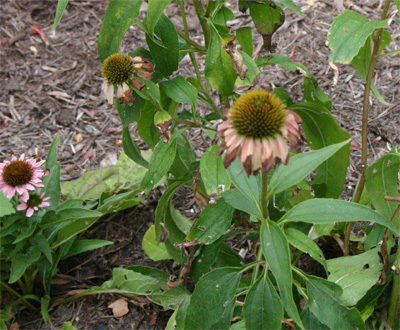
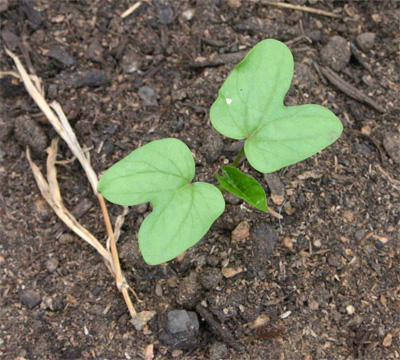
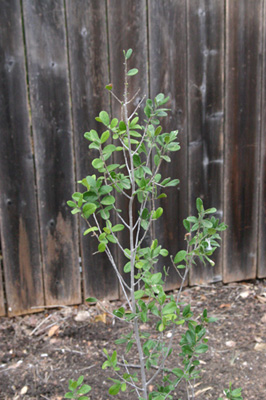 *(from the other son) Why is it that every time you want to plant something, your mom doesn’t have a plant to plant? But when you don’t want to plant something, she has lots and lots.
*(from the other son) Why is it that every time you want to plant something, your mom doesn’t have a plant to plant? But when you don’t want to plant something, she has lots and lots.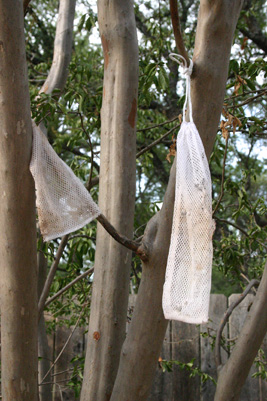
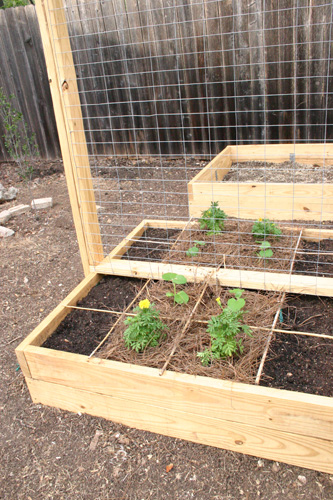
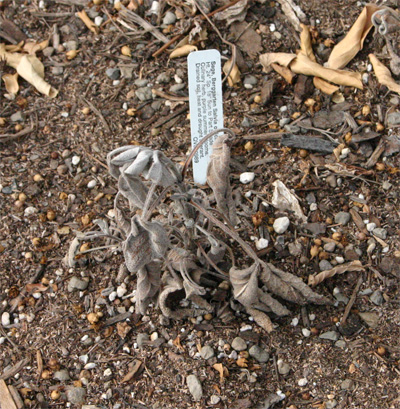 *Why is it that you can spend so much time making your outside yard beautiful and neglect your poor house plants?
*Why is it that you can spend so much time making your outside yard beautiful and neglect your poor house plants?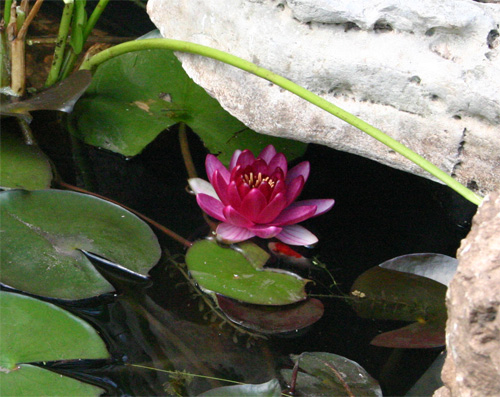
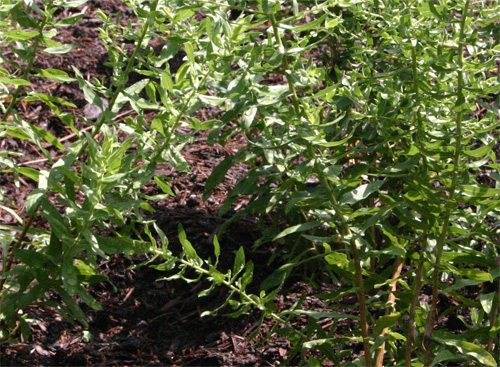
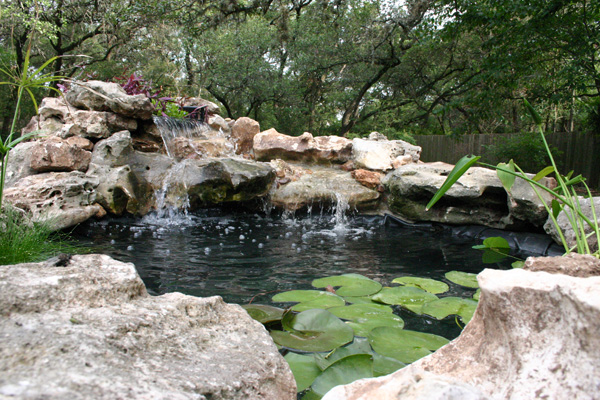
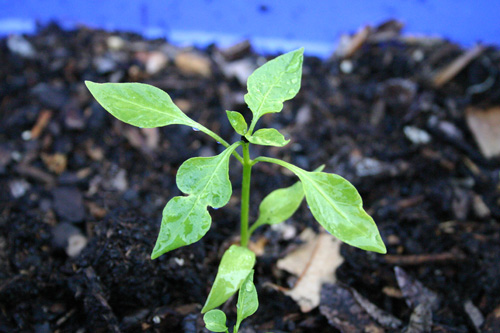

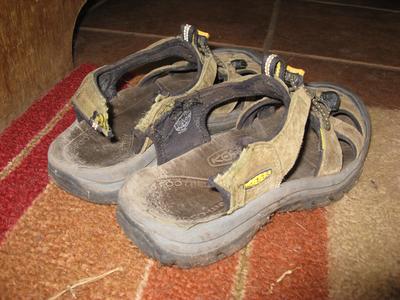
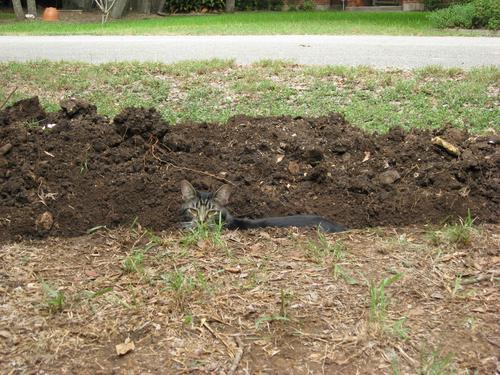
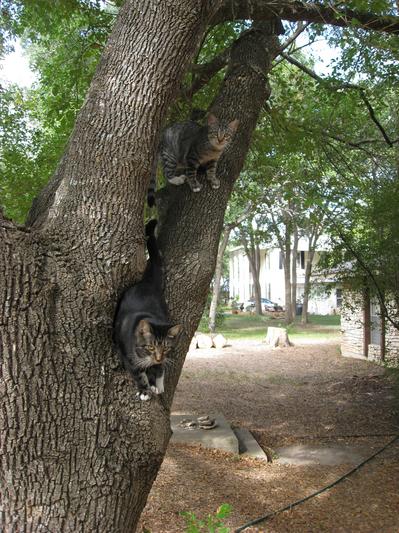
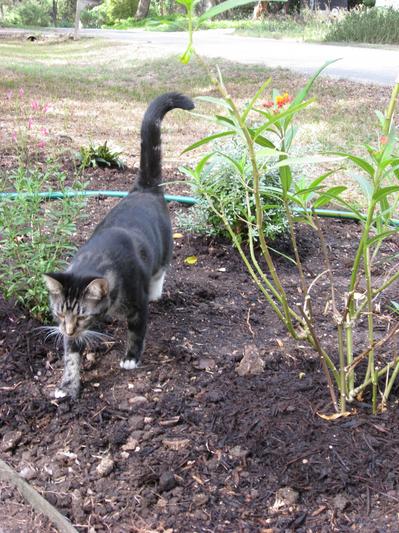
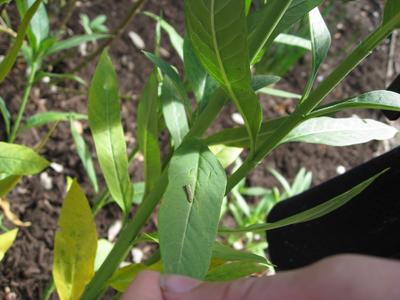 As one of my plant purchases, I chose a baby Dutchman’s pipevine, only to discover the next morning that it was half gone thanks to a big pipevine swallowtail caterpillar! That hungry caterpillar was awfully cute though.
As one of my plant purchases, I chose a baby Dutchman’s pipevine, only to discover the next morning that it was half gone thanks to a big pipevine swallowtail caterpillar! That hungry caterpillar was awfully cute though.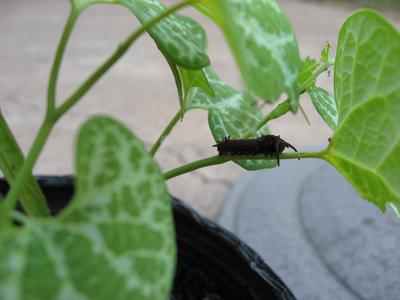 But I didn’t have enough plant to support it, so I took the caterpillar back to
But I didn’t have enough plant to support it, so I took the caterpillar back to 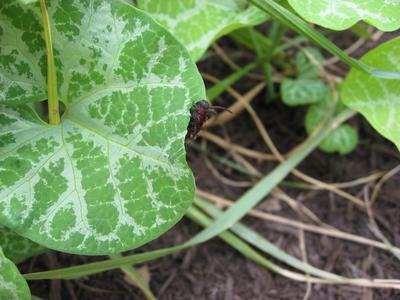 A toad made use right away of the toad bath we made .
A toad made use right away of the toad bath we made .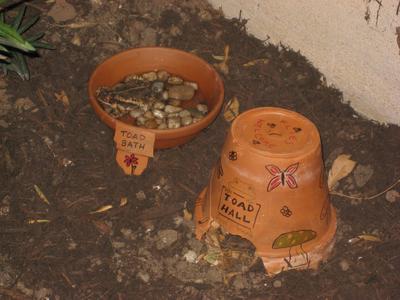 Below is a view of the butterfly garden before I put in the edging — the butterfly shape is at our kids’ request. I’m not going to overdo the edging in the yard, but I wanted to make sure the butterfly shape stayed. It was a pain to get those wings even! You can see the original and much smaller bed in the butterfly shape. The area along the fence and house, separated by a line of bricks, will be a bed we prepare for spring planting.
Below is a view of the butterfly garden before I put in the edging — the butterfly shape is at our kids’ request. I’m not going to overdo the edging in the yard, but I wanted to make sure the butterfly shape stayed. It was a pain to get those wings even! You can see the original and much smaller bed in the butterfly shape. The area along the fence and house, separated by a line of bricks, will be a bed we prepare for spring planting.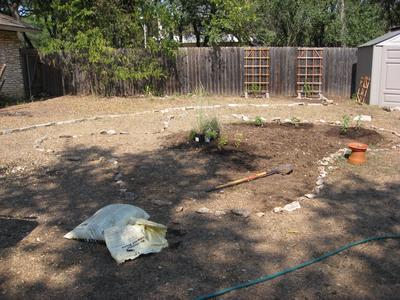
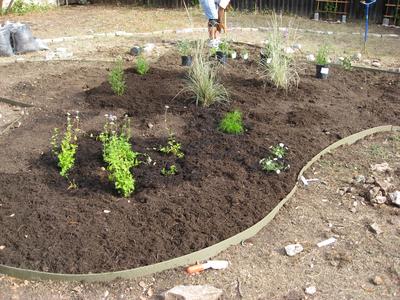
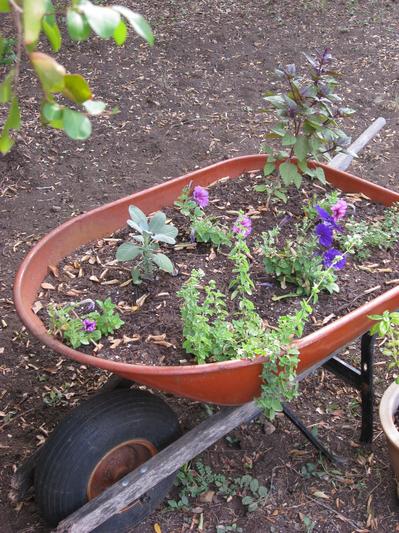 Eastern tiger swallowtails came to visit this weekend, and two danced and went off together.
Eastern tiger swallowtails came to visit this weekend, and two danced and went off together.